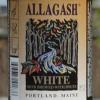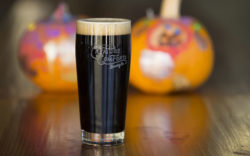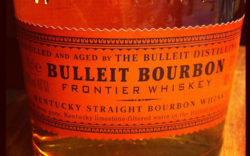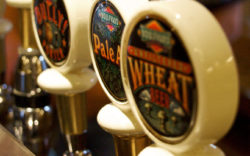That craft beer you like, it’s pretty good. You get to avoid the cheaply made domestics, impress (or irritate) your friends with your refined taste and support independent craftsmen all at once. Except that supporting independent business doesn’t always happen when a beer drinker picks up a six-pack of craft beer.
The reason? Snakes in the grass in the craft beer Garden of Drinkin’. Specifically, these snakes are the so-called “crafty” beers. While marketed as independent craft brews, these beers are actually owned by the large, multinational beer companies Anheuser-Busch InBev and MillerCoors.
The most popular brands of crafty beer are well-known: Blue Moon and Shock Top. Owned by MillerCoors and ABI, respectively, these two wheat beers try as much as possible to obfuscate their origins. Blue Moon’s tag line is actually “Artfully Crafted,” a sneaky phrase that implies that it is in fact a craft beer when the opposite is true. Hooray, marketing!
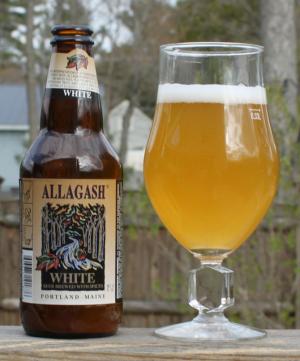
What You Should Drink Instead: Monday Night Brewing’s Fu Manbrew is locally produced in Atlanta, and it’s a wheat beer made with ginger for an interesting kick. If you dislike ginger, go for Allagash White instead. I don’t often cite BeerAdvocate scores when reviewing beers, but the difference between Allagash and Blue Moon is striking: out of a possible 100 points, Allagash gets a 93 overall. That’s outstanding. Blue Moon’s score? A lowly 78.
Jacob Leinenkugel Brewing Co. is perhaps the original crafty beer. Once an independent brewery, it was purchased outright by MillerCoors all the way back in 1988, when Ronald Reagan was president and there were two Germanies. While its website lists all sorts of different styles, ranging from a double IPA to something known as a “Big Butt Dopplebock,” the style they are most known for here in Athens is their Sunset Wheat, commonly referred to “that beer that tastes like Fruity Pebbles.”
What You Should Drink Instead: If your preferred drink is a beer that tastes like Fruity Pebbles cereal, you should probably just stick with what you’re doing. You have the intricate palate and sophistication of a small child. If not, Third Shift Amber Lager doesn’t get as much attention as Blue Moon or Leinenkugel, and for good reason. It’s just a simple, easy-drinking lager that has a fuller taste than its ownership, MillerCoors.
Or try Yuengling Traditional Lager. Seriously. While Yuengling seems like a gigantic brewery along the lines of Budweiser and Coors thanks to its ubiquitous television ads, it’s actually much smaller than ABI and MillerCoors. The brewery that’s closest in size to Yuengling? Sam Adams. Yuengling actually overtook Sam Adams as the largest American-owned beer producer in 2011. (Anheuser-Busch InBev is actually owned by Belgians, and after several mergers, MillerCoors is now a Canadian-British joint venture.)
If Yuengling doesn’t strike your fancy, check out Heavy Seas Cutlass, an amber lager that won multiple medals at the Great American Beer Fest between 2006–2010.
Redd’s Apple Ale is an irritating creation. It tastes marginally like apples, it’s branded with apples and seems designed to appeal to cider drinkers. While not a problem for most cider drinkers, those with gluten allergies will have a negative reaction to this beer, as it was brewed with malted barley alongside apples.
What You Should Drink Instead: Almost any cider. If you want an apple flavored alcoholic beverage, it just makes sense to get a drink brewed directly from apples without any messing around with any extra nonsense. But beware: Crispin Cider and Foxbarrel Cider are owned by MillerCoors and Angry Orchard is owned by Sam Adams, so your best bets for independently produced ciders are Jack’s Hard Cider and Hornsby’s Hard Cider.
So, casual beer drinker, why should you care which beers are independently owned? Independent craft brewers are constantly innovating and refining their products and have created a sizable market for connoisseurs to enjoy. Crafty beer only came about when ABI and MillerCoors realized that craft beer was growing at a much faster rate than traditional American light lager.
Moreover, many of these crafty beer companies only produce one style: an OK wheat beer flavored with different fruits that’s presented as refined and sophisticated. If you care about varieties of style, supporting microbreweries just makes sense.
When in doubt, a general way to recognize which breweries are independent and which aren’t: national advertising. If you see a TV commercial for a product, it’s probably not independent. (Yuengling and Sam Adams are exceptions to this rule.) Billboards around Athens telling you to drink Henry Weinhard’s? Surprise! It’s owned by MillerCoors.
When in doubt, you can whip out your phone and run an Internet search. You’ll find the beer’s owner pretty quickly.
Like what you just read? Support Flagpole by making a donation today. Every dollar you give helps fund our ongoing mission to provide Athens with quality, independent journalism.



